From Cheyenne to Omaha, the Dark and Lonely Road
What do you do with the realization that you're never going home?
This is a free post made possible by paid subscribers.
Writing is my profession and calling. If you find value in my work, please consider becoming a subscriber to support it.
Already subscribed but want to lend additional patronage? Prefer not to subscribe, but want to offer one-time support? You can leave a tip to keep this project going by clicking the link of your choice: (Venmo/Paypal/Stripe)
Thank you for reading, and for your support!
The trip from Rock Springs to Cheyenne was a little over 250 miles. At Wyoming’s 70-80mph speed limits, that meant roughly four hours of drive time. It stayed cold and windy all day, with big digital warning signs over the interstate that trucks under 40,000lbs gross vehicle weight were likely to blow over. And in the landscape of south-central Wyoming, you could clearly see why. There was nothing to stop those gusts from hitting anything passing through with incredible force.
At a rest stop somewhere between Elk Mountain and Arlington, I hoped to get out the drone to grab some footage of the sun setting behind a snow-capped peak, but there was no chance I could fly the little guy in the gale-force winds. I had to settle for some point-and-clicks from my phone.
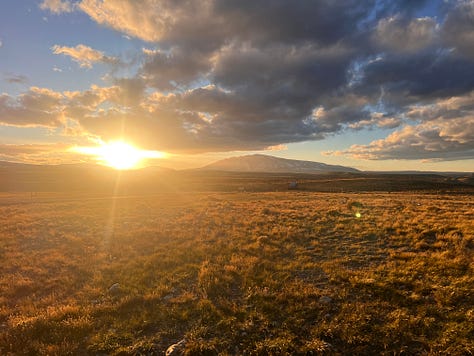
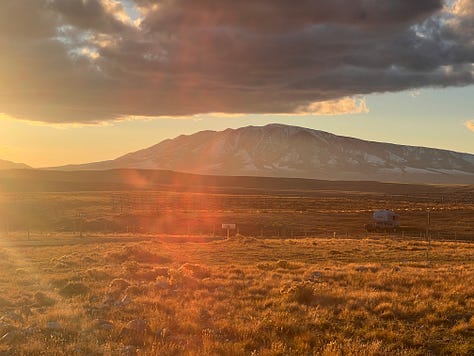
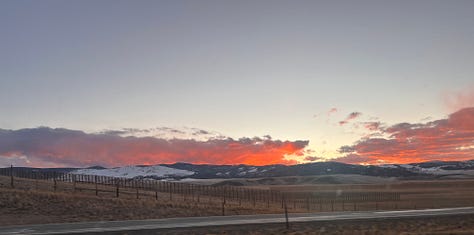
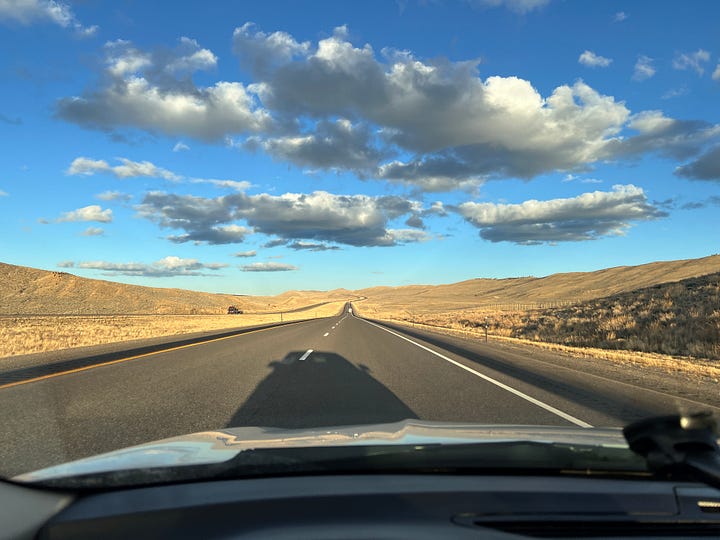
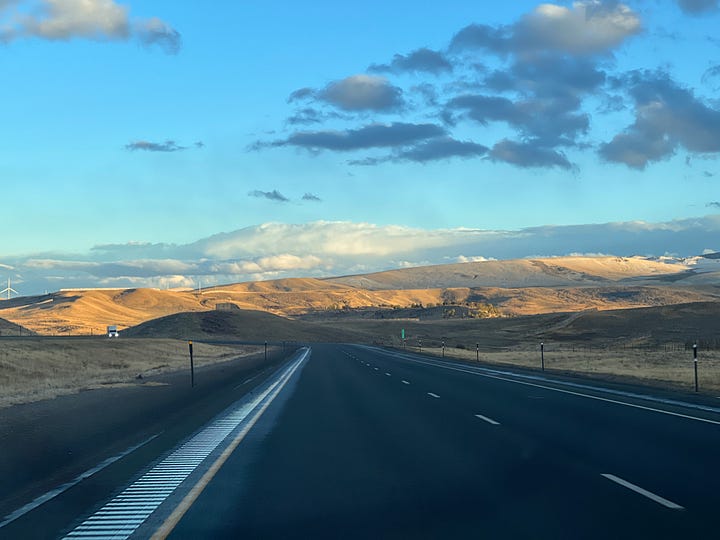
After another long day on the road, I arrived in Cheyenne well after dark, and the hotel was so underwhelming I didn’t even think to take a picture.
I should have, though, because it would have looked like one of those great photos of liminal places, a bright glowing outpost of desolate mediocrity in a sea of meaningless darkness.
Don’t get me wrong: it was far from the worst place I’ve ever stayed. I’ve been to a Motel 6 that smelled like previous guests had urinated on everything in the room. I’ve slept in a pay-by-the-hour motel in Mexico City where I didn’t dare take off my clothes and get under the blankets. I’ve spent the night outside an unexpectedly-closed train station in the freezing cold in barely-post-Soviet-era Bratislava, walking to keep warm for hours while gunshots rang out in the distance.
By comparison, this hotel was fine. Dingy, cheap, basic, but fine.
But by the time I’d reached Cheyenne, I’d been totally alone for five days, driving long stretches of open highway, with nothing to think about but how my life had gone so far sideways I didn’t even recognize it anymore.
I knew, from the moment I’d left Chicago to head West into the unknown, that the solo part of the journey would take away all the comforting distractions that had kept my head above water for the previous few weeks. But the call of the West, the anticipation of great natural beauty, it had all helped a little with the isolation and the anticipation and the thousands of miles of lonely introspection on the endless expanse of American interstate.
But now I was heading East again, having given up the quest prematurely with the understanding that it would likely only yield diminishing returns. And that meant thinking about what I was facing, going “home” to a place where I had no home, no friends, no idea what I was going to do to build a new life at the end of my 40s.
I didn’t know what to expect. Any attempt I made at talking about the future hit ten-foot-thick walls. I couldn’t get closure on what she thought might come, but the evasive silence and subtle suggestions of impossibility felt like nails in a coffin. I knew I needed to stay in the lives of my children, but I didn’t know how to navigate the particulars. I never wanted any of this, and now I was battling a constantly-regenerating state of denial that kept creeping back in, telling me maybe things could just be normal again.
I knew it wasn’t true. But the parts of me that cling to familiarity, safety, and belonging kept delusionally refusing to let it go.
Nothing about the month I’d spent away from home had changed anything about what I was facing. If anything, it had hardened it into an impenetrable, unavoidable certainty. Two very different narratives about who I am had emerged after the dust settled — the one I was experiencing, and the one I was trying live down. And there was no way for them to meet in the ground of objective reality.
It was cold in Cheyenne that night, several degrees below freezing, when I hauled my stuff into the hotel through a back door under the harsh white glow of fluorescent security lights. The room itself was dimly lit, carpeted in dark brown, with weird off-color LED bulbs giving out tepid light that made the whole place look sickly. I could vaguely smell the residual odor of however many dogs had been in the room before I rented it, under a thin veneer of sprinkle-on carpet cleaning powder.
I was hungry. The clerk had told me there was a decent Mexican restaurant within walking distance, so I headed back to the desk and asked him to show me the way. He dipped his head and pointed out the window across an expanse of rugged parking lot.
“You see that flickering light over there?” He asked. I looked. I didn’t see anything but another hotel a few hundred yards away.
“Yeah,” I lied.
“That’s it,” he said.
I didn’t know where it was, but he’d pointed in the right direction, and that was enough. I knew I’d find it if I just started walking. My body had not yet adapted to the cold, though, and I wasn’t excited about walking out the door into the frigid night. I had my winter coat with me in the car, but I didn’t want to haul it inside along with everything else, so I was just wearing a regular black hoodie, warm enough for temperatures about 20 degrees above where they were now. It didn’t even have a thermal lining, and the cold wind cut through it like shards of shattered ice. The pavement was broken and uneven — the kind of surface you had to be careful not to trip or roll your ankle on — and there was a building that looked like it had been a restaurant of some kind, boarded up and shrouded in darkness, sitting inert along the path. The hotel lights behind me were an oasis of brightness in a sea of inky black, but their illumination had fallen off steeply by this point, and the abandoned building felt like a tomb.
On the other side of that old structure, I found what I was looking for. A squat, stucco building with a neon “OPEN” sign in the front window, broadcasting the status in red and blue. I didn’t see the name of the place, but anyone who has ever seen a sit down Mexican restaurant has a pretty good idea how most of them somehow end up looking. I scanned the building and saw the buzzing, flickering light under the eaves on its back corner that I couldn’t pick up from my vantage point through the window of the hotel lobby.
I walked in and got a table for one. It was a little after 9PM, so the place was mostly deserted. I was seated just one booth away from a salt-and-pepper haired, bearded man who looked to be in his late 50s, and two younger women, both of them blonde. The man was decked out in flannel, with a meshback cap done up in hunter’s camo. The girls were heavyset, and wore glasses, and looked to be sisters. As I perused the menu, I realized that the place was so quiet I could hear every word of their conversation like I was sitting with them in their booth.
I ordered a Negra Modelo and a taco combination plate, and went to town on the chips and salsa. Three small ceramic dishes each held a different kind of sauce, one of which had chopped, raw mushrooms as part of the mix. I’d lived in the Southwest on and off for a decade, and been to Mexico several times, but I’d never seen that particular variety. It tasted exactly how you’d expect a salsa with mushrooms to taste.
My food came out quickly, and as I ate I couldn’t help but listen to the animated conversation going on just a few feet away. I began picking up enough context to realize that this was a father and his two daughters, and that they didn’t all live together. The girls were admonishing him for not taking better care of himself, and upon questioning him about a lingering cough, the older of the girls told him if it didn’t go away soon, he needed to get to the doctor. He laughed, and tried to dodge.
I wanted to speak up. I wanted to also laugh and say, “Guys don’t go to the doctor because we don’t want them to tell us something is wrong with us. Then we’ll have to to something about it. Better not to know.”
But it wasn’t my conversation. They weren’t my daughters. I wondered, idly, if this was how future conversations with my own daughters would look — us getting together in the booth of some restaurant, stepping around the elephant in the room that was my broken relationship with their mother, trying to reconnect over a meal that wasn’t cooked at home because we weren’t allowed to live together anymore.
I did my best to push the thought away.
I finished my meal, and the waitress asked me if I wanted another beer. I declined, and headed to the register to pay my tab. Nobody was there, so I flagged down one of the girls who worked there. She came over and rang me up, and as she punched in the ticket, I noticed a small painting of Saint Martin of Tours over the register. I was going to ask her about it, make a little Catholic small talk, but when the register spat out the receipt she slapped it down on the counter and walked away, thanking me for coming without looking back over her shoulder at all. It was clear that I was the only one of the two of us who felt the need for some kind of human interaction, however perfunctory.
I paid, then exited, crossing the dark parking lot back to my hotel, pulling my hood up against the chill of the wind. A large meteor streaked across the sky from right to left, burning a bright, pale green before disappearing just above the horizon.
I hadn’t seen one like that in many years.
In the morning, I got up and headed down to the breakfast area, only to find that there was virtually no protein and not much I could eat in general. Most of it was some form of wheat — muffins, bagels, toast, pastries. I tried to spend a little time writing, only to find that the wifi — which had been advertised as “high speed” — was almost as bad as dialup. Just trying to load a picture into a post was taking forever. I gave up, closed my laptop, and packed up.
I needed coffee and food.
On the road from Rexburg to Rock Springs the previous day, I’d stopped at a beautiful little coffee shop in a town called Pinedale — an isolated outpost in a long stretch of nothing in Wyoming. It was called Pine Coffee Supply, and it had the kind of well-designed, intentionally rustic sign that signaled that the people who ran the place had good attention to detail — almost always a solid indicator when it comes to the particular rubrics of a good cup of coffee.
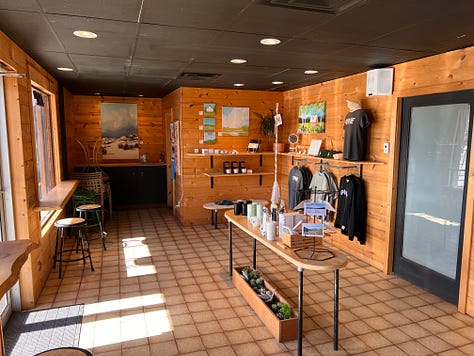
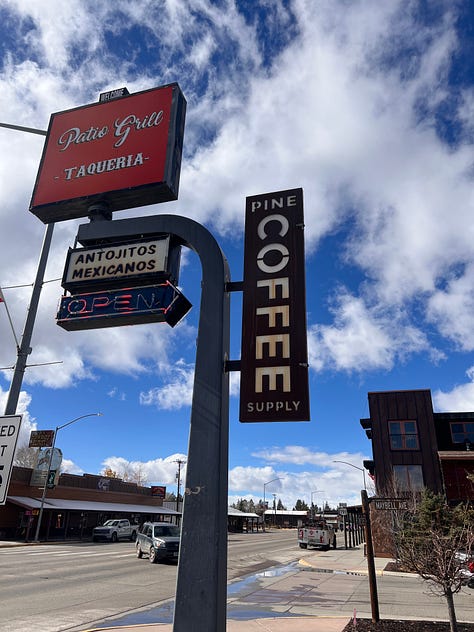
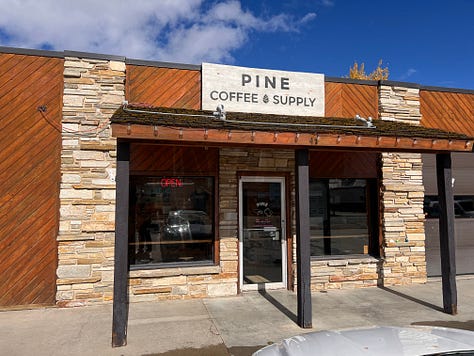
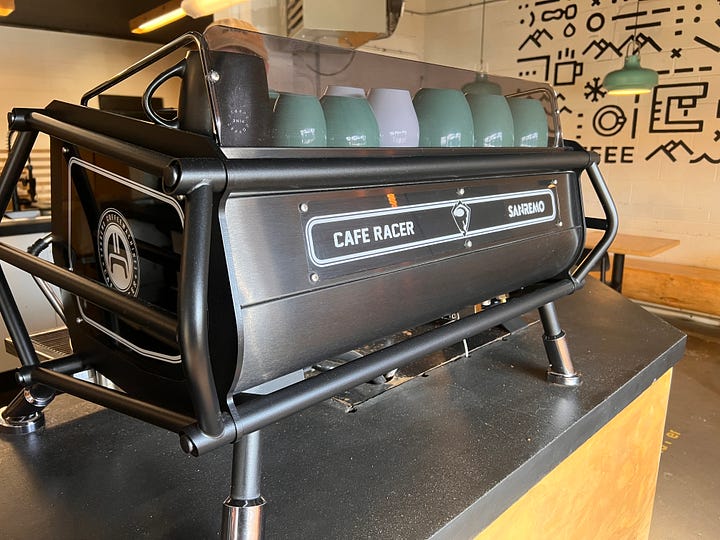
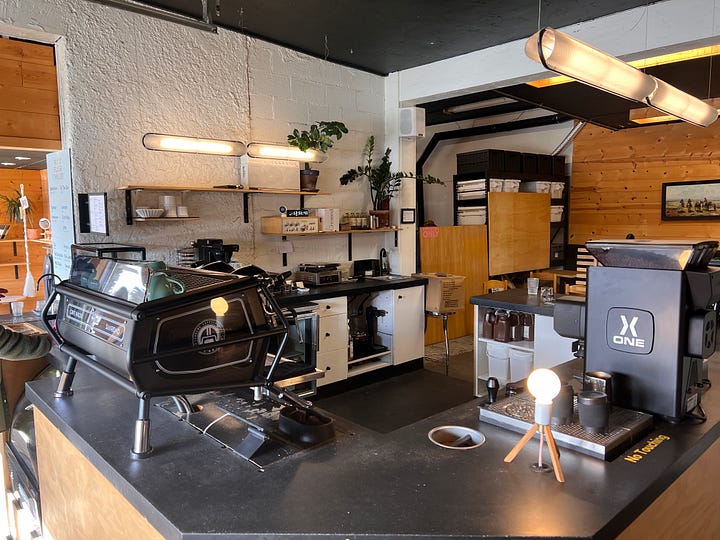
The shop had had local merch and artwork for sale in the lobby: artisanal soaps and candles and teas, along with mugs and shirts and other odds and ends. I struck up a conversation with the guy who’d come to the counter to take the order for my latte.
“That’s a cool espresso machine,” I said. “I’ve never seen one of those. Cafe Racer?”
“Yeah,” he said, as he began grinding and tamping my espresso, “it’s the number one machine in Australia.”
“Really?” I said, both surprised and interested. “I’ve seen Synessos and La Marzoccos, but never a Cafe Racer.”
“I hate Marzoccos!” he said with disdain, as he began pulling my shots. “They suck.”
I’m inclined to take his word for it. I’ve had a lot of espresso shots pulled from Marzoccos over the years, but the latte he handed me turned out to be one of the best cups of coffee I’ve had.
But Pinedale, and that little shop, were hours and an overnight stay in the rear view. Pining for their coffee (nyuck nyuck) wasn’t going to do me any good.
As the capital city of Wyoming, I figured Cheyenne might have some decent options, but I was going to have to find them. I loaded my gear and checked out, and as I sat shivering, letting the engine warm up, I started looking on my phone for somewhere to eat breakfast. The stuff in the hotel lobby had been lacking anything with protein.
I turned on my seat heater, but I had no idea what the air temperature was set to. Evie had developed a new, extremely annoying problem, the morning I left Rexburg. The infotainment screen, which contained all my stereo controls, my cabin temperature readouts for heating and cooling, and my backup camera display, was dead. I’d been having problems with the system since I bought the car, and was set up to have it replaced when I got back, but the dead screen was new. The battery was clearly fine, because she started up on the first try, but if I didn’t drive for at least 30 minutes, shut the car off, open the door to kill the power, then start her back up, the system just would not turn on. In fact, it wouldn’t even supply power to the USB port until that process had been completed. It was like somehow it needed the alternator to warm it up. I spend a lot of my time on the road listening to books and podcasts, and not being able to do that was frustrating. Not being able to set the air temp was, too. And you don’t realize how much you come to rely on a backup camera until it stops working.
It’s funny, though, how you learn a car’s quirks over time. They’re kind of like pets in that way. They can’t talk to you, but you start to become familiar with their limits and eccentricities. We’d had a stretch where we bought only new cars because we wanted reliability and a good warranty, but our renewed frugality had brought us backed to buying used in recent years. Every car had its own history, its own personality. You learn how to work with its rhythms, to coax it into giving you what you need. You start to pick up on the subtle differences between minor and major shifts in their behavior, and build new habits around those interactions. It’s a kind of relationship, and there’s a sort of intimacy to the knowledge you have that someone else who might borrow the car for just an afternoon would struggle to understand. You feel it when the engine is running a little ragged, or acceleration is more sluggish than it should be. You sense when it’s ok, and when it’s off.
Over the course of this trip, I’d been learning Evie’s quirks, and now they were changing in ways I didn’t expect.
Come on girl, get me home.
I found a place in town that specialized in omelets, just a couple miles away, and headed off in that direction. It was cold but clear, the sun shining brightly over a landscape encrusted with an inch or two of unmelting snow. Cheyenne, as it turned out, was a very Western-themed town. Old brick buildings had retro signs for places like The Wrangler Ranchwear store, or The Atlas Theater, or The Plains Hotel. I would usually have stopped to snap a few photos to capture the vibe, but I was cold, tired, hungry, cranky, and wanted to get back on the road. Now that the decision was made to head back, I just wanted to get it done.
I did stop and grab one low-effort shot out the driver’s side window, though. I loved the look of the old Lincoln Theater:
The omelet place was inside an old house nestled up right next to a Victorian-style mansion. The main dining area was a cozy room with low ceilings, gray walls, and a reclaimed hardwood floor. It felt like sitting in someone’s parlor. The service was efficient, the food was delicious and filling, and the prices were reasonable. Exactly what I needed. Fed and ready to go, I headed out, topped off the tank and grabbed an unusually good gas station coffee, then hit the road.
I’d decided to mostly re-trace my route on the way back east, although snow along I-90 had pushed me further south to I-80 for this leg. It was a 14 hour drive without stops from Cheyenne to Chicago, where I had a standing invitation to stay again with Fr. Michael. (I’d also left my trusty Stanley camp coffee pour-over in the rectory dish drainer by accident, and I wanted it back!) I decided not to try to push all the way there in one day. I could do long drives like that as a younger man, but 8 hours had become my new sweet spot. Looking at the route for spots around the midway point, I settled on Omaha, Nebraska as the best place to stop for the night.
In some areas of the country, getting a cheap hotel had been easier and just as cost effective as a room through Airbnb. I’d been using an app to find last minute deals on hotel rooms when the places aren’t fully booked for the night and need to fill beds. I was impressed with the prices, and even better, every time I booked they’d give me an Airbnb credit to use later. So when I found a room through Airbnb in Omaha, the credits I’d racked up got me a place to stay for only a little over $20.
It was a longer drive than the miles alone might suggest. I was back in the drab, late-autumn landscape of the agricultural Midwest. No majestic vistas or far off mountain ranges to look at. Just flat, endless fields. Every day of the solo trip had been harder than the last, each forcing me to confront the reality of being alone after spending half my life intimately intwined with another person and surrounded by my children. But now that I was on the return arc, the difficulty actually ramped up. I was spending countless hours with nothing to think about but the upside down life I was heading back to face. At the end of a long trip, all you want to do is go home to your own house and sleep in your own bed. I was struggling to come to terms with the fact that I didn’t have either of those things anymore. It’s one thing to know it, intellectually, as some abstract point of data, that you can shove aside while you deal with other things. It’s another to have to accept it as your new, inescapable reality. It’s like a bad dream you just want to wake up from. The kind of thing you never really believed could happen to you. As long as I was on my adventure, that was a problem for future me. But as the distance between where I was and where I was headed kept shrinking, the cosmic horror of the total usurpation of anything like normalcy weighed on me like a boulder.
About a hundred miles outside of town, I made a pit stop for gas and coffee and a restroom break. I pulled up to the pump and looked up, and almost laughed at the sign. All day, I’d been driving through a bleak landscape, thinking about how I can’t go home, only to wind up in literally Nowhere.
The last leg of the trip passed by relatively quickly. Once again, I pulled into town after dark. As I’d gotten closer to Omaha, the weather had worsened, and by the time I was inside the city limits, it was cold and rainy. There were a couple of downpours, but this was mostly the kind of cold slurry drizzle that sticks to the windshield — as much from the tires of other cars as the sky — smearing beneath the wipers and making everything blurry. The roads were slick to the point of being reflective, and it was hard to see the lines separating the lanes. At one point, I narrowly missed running into a curb I couldn’t even see. But I hadn’t eaten a meal since breakfast again, and I wanted something before heading to my room.
I was surprised how nice Omaha turned out to be. I’d never thought of anyplace in Nebraska as upscale, but this was an unexpectedly vibrant city that looked to be developing a pretty decent food scene. I picked a place more or less at random from the GPS suggestions nearby. I wasn’t in the mood for anything in particular, I just didn’t want it to suck. The restaurant I chose turned out to be a fast-casual burger joint, and that worked for me. The prices turned out to be only a couple bucks more than your average fast food place, and it was much nicer. Huge interior space done up in a modern industrial style: stained concrete floors, exposed beams, high ceilings warmed up with natural wood-toned slats, huge windows, and brightly-colored upholstery, all tied together around a big, brightly lit bar. The place was mostly empty, but for whatever reason, the service was slow. I sat at my table, alone, having already decided what I wanted, just waiting. It would normally have been a place with my kind of vibe, but I felt…off. I’d been brooding all day, and eating alone at every meal was starting to get to me. To top it off, I’d just found out that even if I got back to Raleigh by my birthday in mid-November, my family would be out of town that week. I’d be spending that one alone, too.
Now, I don’t particularly care about my birthday. At my age, I’ve had plenty. But in my family, we tend to make a big deal out of them, to celebrate the person and show them love. We usually do a special dinner, and an activity we can all enjoy together. The thought of being alone on that day wasn’t about missing out on cake or ice cream, but the loss of connection to those I love most.
It reminded me of this one Thanksgiving, back in college, when I’d been unable to go home for the holiday, but also didn’t have anyone local to visit. The cafeteria had been closed, and I’d resorted to sitting in my dorm room, eating a single packet of Quaker instant oatmeal that had been in my desk drawer for months. Just a watery bowl of apple-cinnamon-flavored slop in lieu of the turkey and stuffing and pies and human interaction I was craving. I’d walked around the neighborhoods near campus that day, glancing through windows and doors propped open to let out the kitchen heat. I saw people I didn’t know celebrating with people they did. I heard laughter and snippets of conversation. It was, at that time the most “outside looking in” experience of my life. And, frankly, one of the loneliest damn days I’d ever experienced. It was a feeling of just being invisible in a moment that was supposed to be about family and friends and shared gratitude. It was almost as though I had slipped through the cracks into a parallel dimension, and was out of phase with the normal human timeline.
At last, a bored-looking waitress showed up at my table to take my order and pull me away from my thoughts. They had a special on old fashions, one of my favorite cocktails, so I splurged and got one, along with a burger and fries. And then I sat there, taking tiny sips to make the drink last, feeling weirdly like my table was a deserted island, and I had somehow been shipwrecked upon it.
My food, when it came, was quite good. But to be honest, I barely even tasted it. Everything felt wrong, and that feeling threatened to overtake me. I was tired of grieving, but it apparently wasn’t tired of me. Here I was, yet again, in another city I didn’t know, and tonight I’d be sleeping alone again, in another strange bed, in another strange place. It didn’t matter whether I was on a goddammed trip or not, because everything familiar was gone either way. Being on the road just made it make more sense. It contextualized the strangeness, a little, but not nearly enough. Still, it was acclimating me to it, in a way I don’t think I could have accepted if I’d gone straight from my family home into some rented room share, sharing a bathroom and a kitchen with strangers, having only the room where I slept to barely call my own. And if the trip was my way of transitioning to this new reality, that reality hadn’t taken concrete shape yet. It was still the thing that loomed on the horizon of my anticipation, hovering over me like some fairytale monster. It was there, like some cautionary story from the Brothers Grimm, to claim something precious from me I had never meant to offer.
A house full of children.
A hand in marriage.
A whole life.
When my birthday did come, I’d be turning 48. I’d spent exactly half of those years together with the same woman, 22 of them married. A quarter century spent with one person, around whom I had woven every hope and dream of the future as an integral part.
And suddenly, it was almost as though we were strangers.
How do you just move on from that?
How do you walk away from the person you grew up with and raised children with and went through every joy and blessing with along with every awful thing life throws at you…and then find a way to think of them as just someone you used to know? How do you learn to adapt to the way they interact with you when you go from beloved to banished?
As much as I wanted to ask these questions to her, they were for me. Only I could answer them. Whatever might happen in six months, or a year, or ten, I was the only one who could write this part of the story. And yet, I was so used to sharing that pen, to playing the Mad Libs of life together, that every stroke, every syllable, every sentence from my hand alone felt like the searing sensation of violence; the reaving of one soul that had been intertwined with another.
The inescapable reality was this: even if by some miracle we were brought back together in an instant of overwhelming grace, nothing would ever be the same.
Nothing should ever be the same.
We did not arrive at this moment of rupture through random teleportation. We came by way of a long and broken road, and whatever our marriage had been, that version of it needed to die. I was no more willing to go back to the way things were than she was, and I knew it, and that haunted me. The dream of growing old together, watching our children come home with their children, was a dream that couldn’t have been built on the broken foundation that we had. That vision might still exist in some form, down a path splinted-straight and scalpeled-clean by unlikely transformative changes, but the surgery needed to repair it might involve more pain than either of us could bear.
My Airbnb for the night was a small bedroom inside a fairly large suburban home. I followed the instructions for entry, and found myself in a foyer lit by the soft, orange glow of a single, low-wattage bulb, oozing its barely-sufficient luminescence from a table lamp.
The rest of the house was shrouded in darkness. Still. Silent. Empty. Several thousand square feet of silent reminder that I was — and would likely always be — truly, irrevocably alone.
The owner had told me he wouldn’t be there when I arrived, but as it turned out, he never actually came home. My room was right next to the front door, which never opened. I did not even have the comforting knowledge of the proximity of strangers. I was merely a transitory artifact in the cozy trappings of another person’s life, his photographs and decorations all standing in testimony to a real life, even in his absence. A life that wasn’t mine. A kind of life I might never have again.
My bed was a simple mattress on the floor. A small television was my only companion. I turned on a stupid show, pulled out the last of the booze I had in my bag, and used it like a chisel to chip away the soul-deep ache, until every last drop was gone.
It was both too much and not enough.
When sleep came, it wasn’t restful. Every night had begun to shape itself into this pattern: no matter how well I did during the day, the suffocating solitude of late evening would come to smother me in my bed. When I was staying in rented rooms, it would hit as soon as I closed the door. When I was staying with friends, it would come just after they would say goodnight and I would climb into bed. I hadn’t slept alone since I was 25. No bride breathing beside me. No child kicking me in his sleep.
The lack of another human presence felt like the phantom pain of an amputated limb.
In the morning, I awoke with a pounding headache and the queasy feeling that informed me I was hung over. I chided myself for the intemperance, but I couldn’t muster up much self-loathing. The wounds I was nursing were begging for relief.
Even so, I was terrified that this was a preview of the rest of my life.
A man made for deep human connection, suddenly and perpetually deprived of it, plunged into permanent solitude, only capable of bare survival through work, distraction, denial, and self-medication. I knew I could lose myself entirely this way, and over the previous evening I had lived out a premonition of my worst fear: that however much function I could muster up in the daylight hours, the night would always come to claim me. And that, over a long succession of such nights, each blending more and more into the next, I would eventually disappear, sunk beneath the soundless depths of loss and grief, never to resurface.
Would I become a ghost, a golem, a shadow of my former self, a lifeless thing that shambled through existence with neither the courage to extinguish it nor the desire or grit to find a way to thrive? Or would some new version of me find a way to emerge, strong enough to become indomitable?
I didn’t know the answer. It was a question I’d been carrying for weeks, and I knew I would continue to wrestle with it until I found an answer, or lost the will to care.
But for now, I was headed back to Chicago, and I just needed three things: a ton of coffee, a decent breakfast, and to get in the car and drive.
If you liked this essay, please consider subscribing—or send a tip (Venmo/Paypal/Stripe) to support this and future pieces like it.



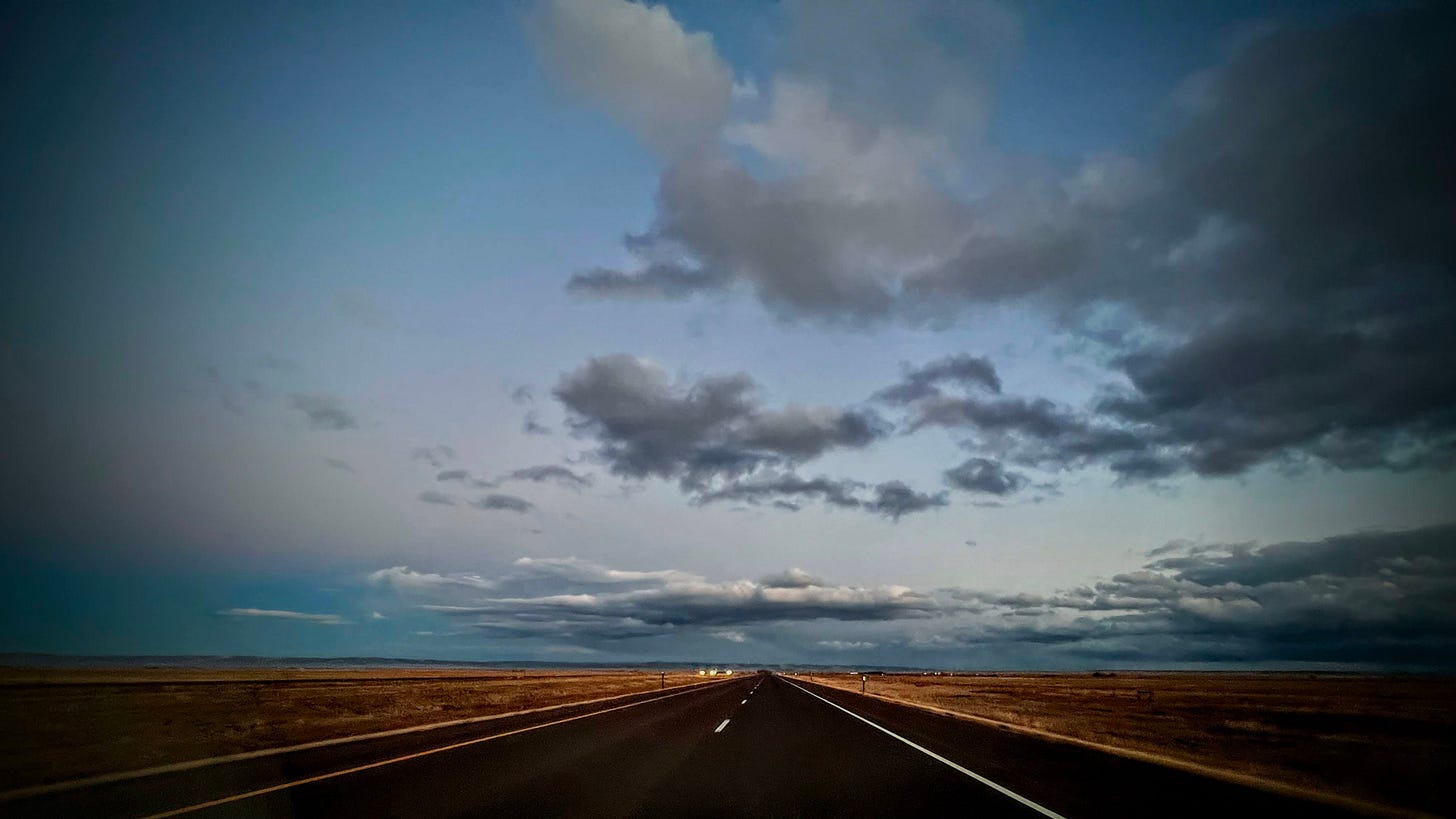
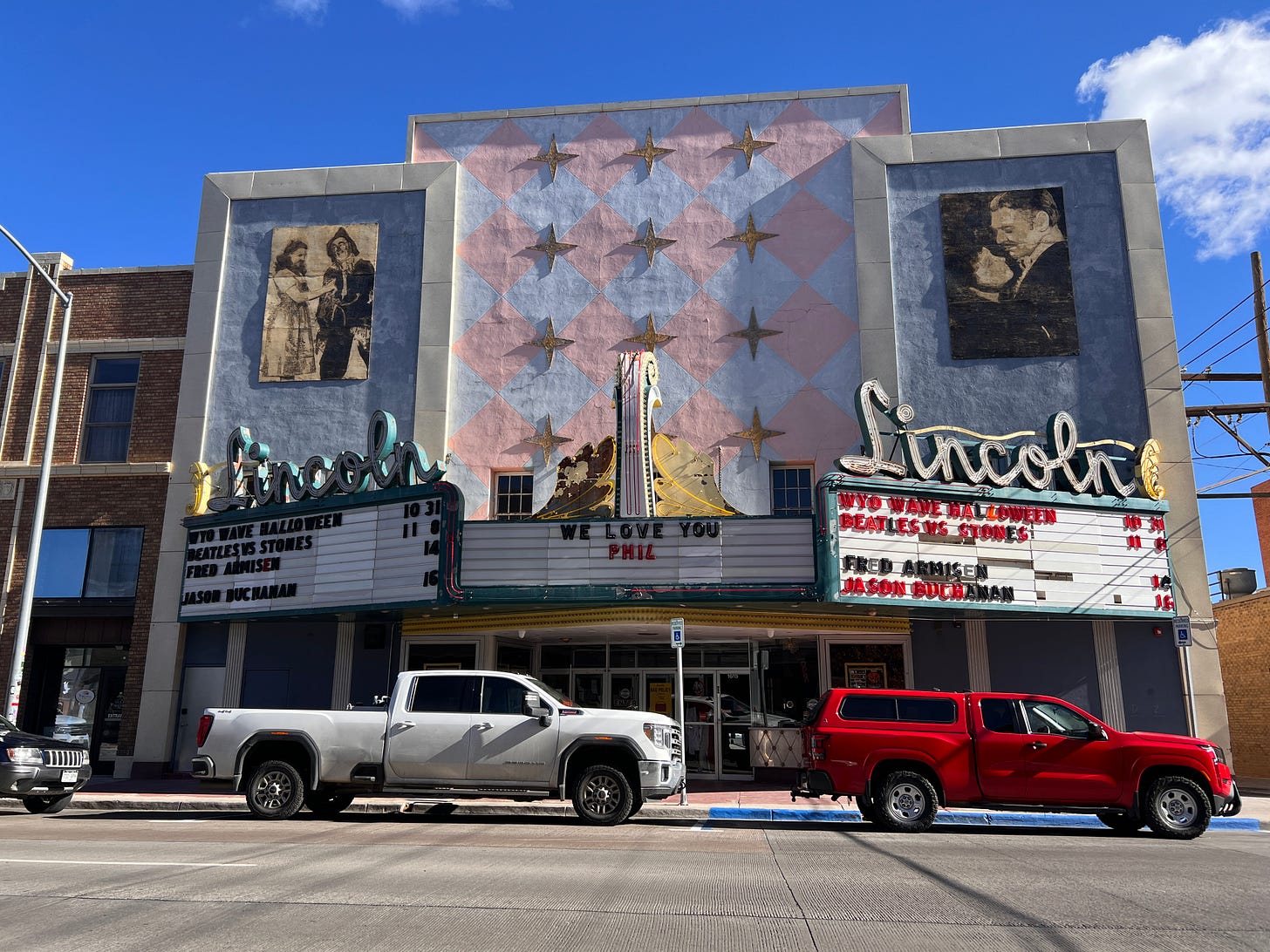
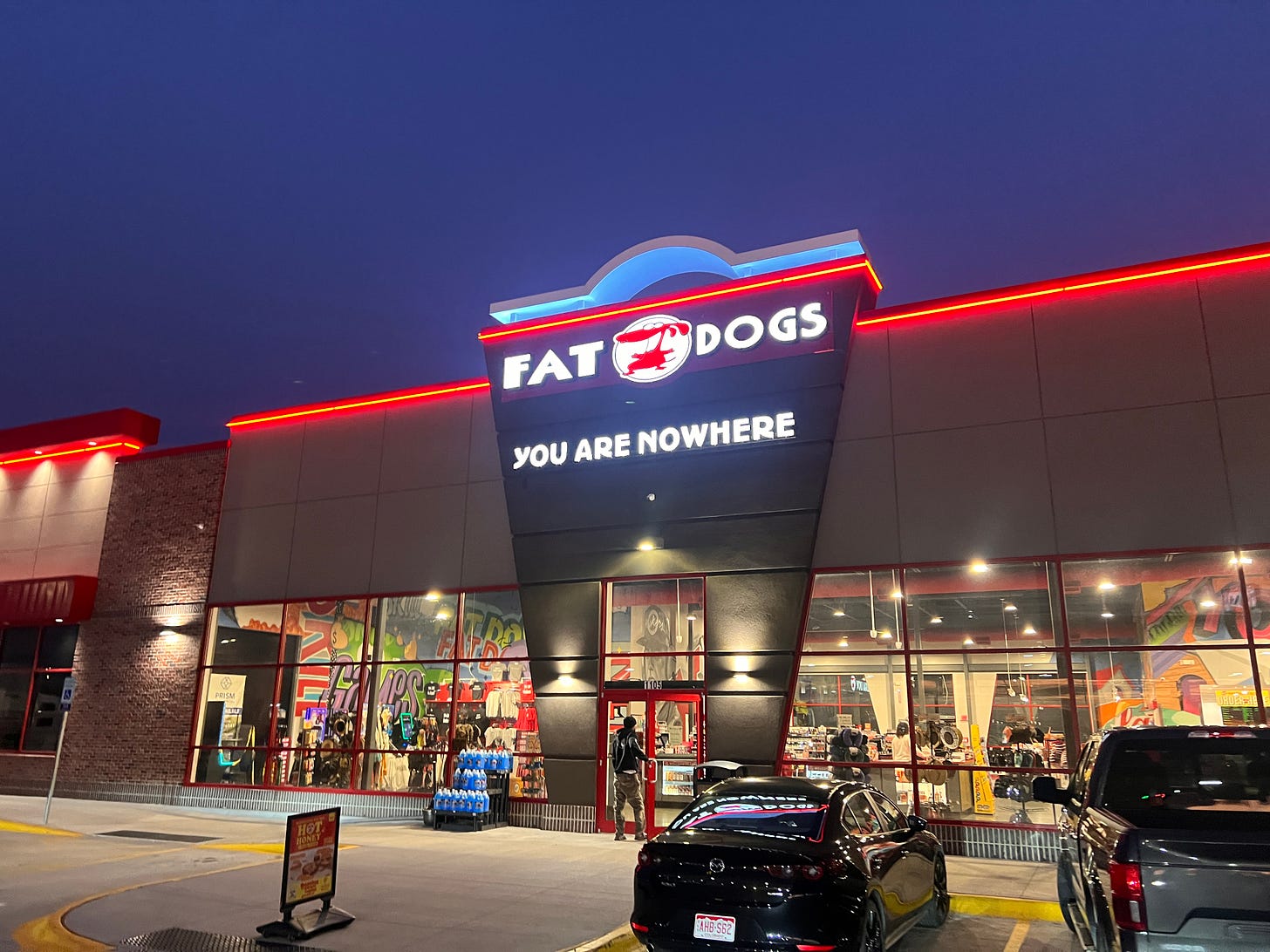
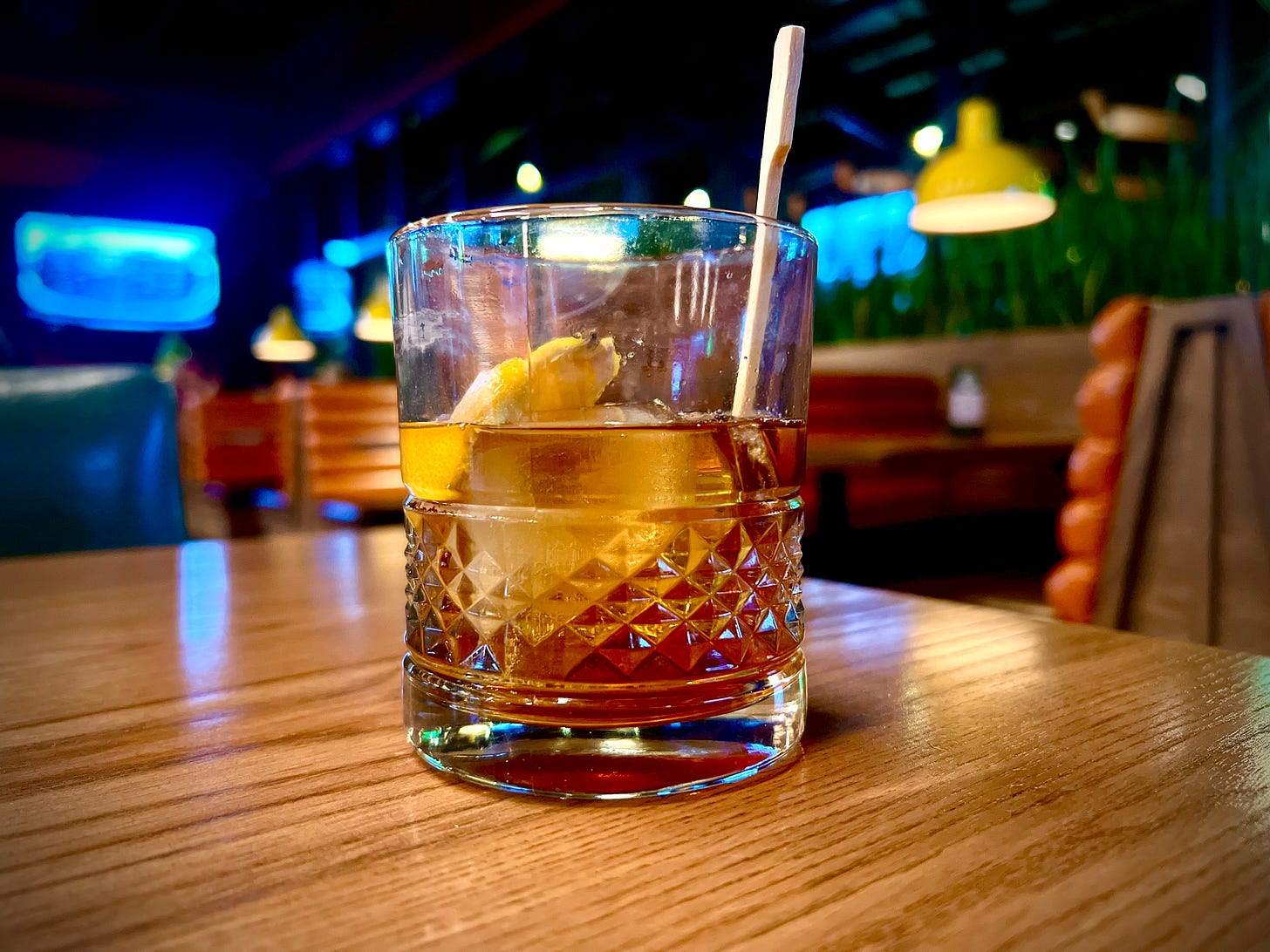
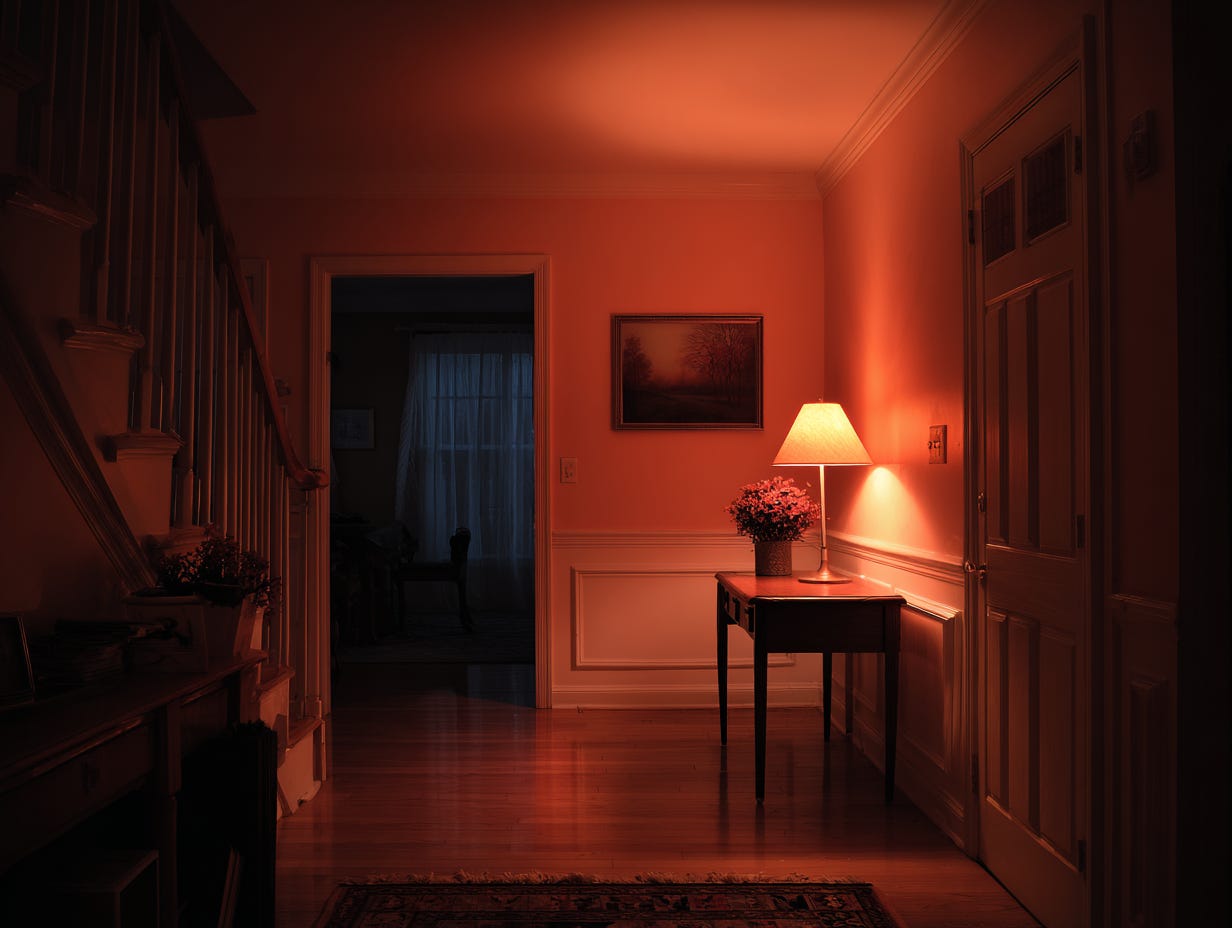
You sure are a good writer. I hope at some point you compile these posts into a book for other divorcing/divorced spouses. This has now become, sadly, a common experience and it's encouraging for others to read that they're not the only ones going through such a hellscape.
My divorce was the most rotten experience of my life -- and that's from someone who lost her mother at age nine. I feel ya. However, my children have given me incredible joy. I'm sure it will be the same for you.
Some of your best writing. I’ve been following, cheering and praying for you for years. I’m praying for your marriage. There’s nothing Jesus can’t fix. I have the scars and the stories.